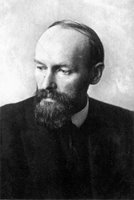one leaf of laurel for: Christian Morgenstern (1871-1914)
da säten Wind und Sonnenschein
ihr Korn hinein:
da schoß es auf
aus rotem Grund
und wuchs mit zuckendem Purpurmund
zum Licht hinauf.
I ploughed the furrows of my heart,
when came the wind and sunshine bright,
their seed to sow;
and shoots would start
from that red soil
with purple quivering lips to grow
up to the light.
(from Melencolia, published 1906)
Christian Morgenstern was born in Munich with a romantic landscape painting grandfather and a musical mother, who, alas, died when Christian was only 10. He spent a peaceful, sentimental, impecunious life, striving to understand the world in general, labouring under the illness he had inherited from his mother - tuberculosis, then incurable - which made doctors send him to places in Italy and Switzerland, where the air was more pure than in Berlin or Hamburg. In one of those places he got to know a really wonderful young woman called Margareta, who kept him the most loving company imaginable for the last six years of his life. Always having been a rather mystic guy, he became one of Rudolf Steiner's (you know, anthroposophy) earliest disciples, before he died in Meran at the age of 43. His last words are said to have been "This cough is four-dimensional."
Morgenstern is chiefly known in German speaking countries for his Galgenlieder, a collection of grotesque poems mostly having to do with the gallows. Fewer readers are familiar with the love, deep insight into nature and tinge of mysticism that marks the rest - nearly the whole! - of his poetry. One of his greatest achievements, by the way, was his translation of all Henrik Ibsen's then available works into German. He undertook that job without knowing a word of Norwegian before he started, and Ibsen, who could read German very well, was genuinely pleased and moved when he read the results. Though other versions are available by now, Morgenstern's extremely poetical rendering of Peer Gynt is still the standard text for stage productions hereabouts.
(More aboutMorgenstern in German, but there are translations of his poems here, even one in Norwegian)



0 Comments:
Post a Comment
<< Home